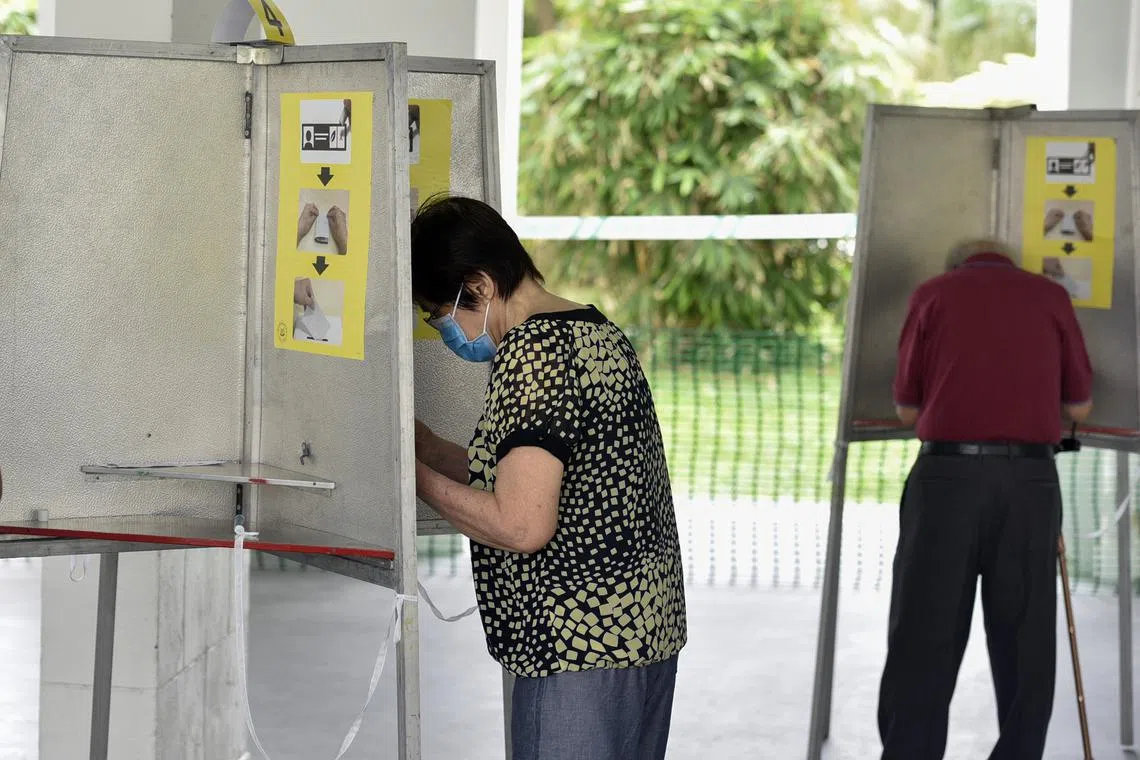Overseas postal voting, polling stations for nursing homes among proposed changes to election laws
Sign up now: Get ST's newsletters delivered to your inbox

The new Bill will allow polling stations to be placed in adjacent constituencies, for the convenience of voters living near electoral boundaries, said the statement.
PHOTO: ST FILE
Follow topic:
SINGAPORE – Singaporeans living overseas will be able to vote by post in the upcoming presidential election if a new law, tabled in Parliament on Monday, goes through.
This means they will no longer need to travel to physical polling stations, which are located in specific cities – a situation that resulted in some voters not being able to vote because of travel restrictions during the 2020 General Election.
The new laws will improve convenience for overseas voters and allow more overseas Singaporeans to qualify to vote, the Elections Department (ELD) said in a statement on Monday.
Singaporeans who are already registered will no longer need to re-register as overseas voters when the register of electors is revised, which typically takes place before elections, it said.
Overseas Singaporeans who would like to be registered as voters will have more time to meet the residency criterion of 30 days in the last three years, it added, as the count will start from the date of their application to be an overseas voter, instead of from March 1 under the old laws, it added.
At GE2020, there were 6,570 registered overseas voters, and of these, 4,794 cast their ballots. In all, there are about 200,000 Singaporeans living overseas.
Changes to the law were introduced by Minister-in-charge of the Public Service Chan Chun Sing on Monday, who said the Bill would be read a second time after the debate on the budgets of each ministry in March.
The ELD said in its statement that the key amendments propose to improve voting arrangements, update election advertising laws, enhance the election expenses regime and strengthen election processes.
There will also be special voting arrangements for nursing home residents under the new laws.
Special polling stations on nursing home premises as well as mobile polling teams can be deployed for residents to cast their votes, the statement said.
The statement added that various factors will be considered in determining whether a special polling station or a mobile polling team will be deployed, such as the number of voters in the nursing home and whether there is a suitable space in the nursing home for such a station.
Changes to processes
The new Bill will allow polling stations to be placed in adjacent constituencies, for the convenience of voters living near electoral boundaries, said the statement.
Under current laws, polling stations can be placed only within the electoral division boundaries.
The Bill will also prohibit those below 16 from taking part in election activities such as making speeches, to ensure that children are protected from exploitation, the statement added.
The current law bans those in primary or secondary school from such activities, rather than on the basis of age.
The law defines election activity as any activity that promotes the electoral success at any election for one or more identifiable political parties, candidates or groups of candidates; or prejudices the electoral prospects of other political parties, candidates or groups of candidates at the election.
This means that children will still be able to participate in election-related activities such as listening to rallies.
The new laws will also bar foreign entities such as companies or organisations from participating in election activities, on top of the current ban on foreign individuals participating in such activities.
They will allow for contingency arrangements to be put in place in the face of disruptive events such as a flood or health hazard.
Updates to election advertising
The new laws will make any boosting, sharing, resharing or reposting of online election advertising subject to the same requirements as any primary advertising.
The ELD said: “Amplification of existing online election advertising increases the reach of the content to more users and has the same effect as publishing fresh content.”
They will also require all election advertising to carry the full names of those responsible for publishing, approving, directing, printing and paying for the content.
To enforce this, the new laws will give the returning officer the powers to direct any content publisher – from individuals to social media companies – to remove the advertisements or disable access by Singaporeans to the advertisements if they break the rules.


